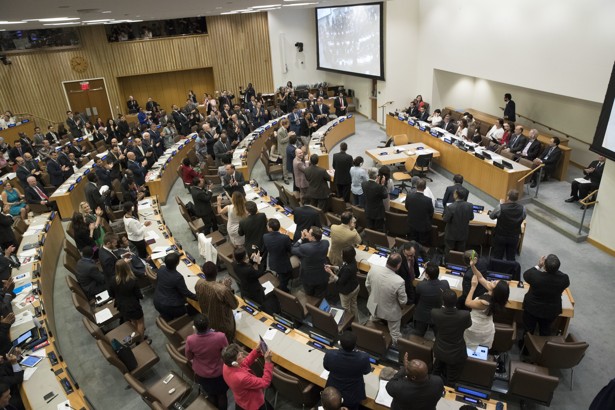Too Little Too Late (Revelation 15)
Despite being a victim of atomic attacks
in 1945, Japan also boycotted the meeting. Nevertheless, the bombings
of Hiroshima and Nagasaki informed Friday’s dialogue—and the
conversation thereafter. “It’s been seven decades since the world knew
the power of destruction of nuclear weapons,” the president of the UN
conference, Elayne Whyte Gómez, told The Guardian.
The agreement, she added, “is a very clear statement that the
international community wants to move to a completely different security
paradigm that does not include nuclear weapons.”
Friday’s ten-page treaty
is extensive in its demands, prohibiting signatories from developing,
testing, manufacturing, possessing, or threatening to use nuclear
weapons. Nations are also prohibited from transferring nuclear weapons
to one another. Having now been approved by the UN, the treaty will be
open for signatures on September 20, at which point it will need to be
ratified by 50 states before entering into international law.The major
obstacle, of course, is that many prominent members of the international
community—and their allies—remain vocally opposed. In a joint statement
on Friday, the UN ambassadors for the U.S., Britain, and France said they had no intention of joining the treaty,
arguing that it “clearly disregards the realities of the international
security environment.” Of particular concern, they said, was the fact
that the treaty failed to address of the growing threat of North Korea’s
nuclear and missile programs. Earlier this week, North Korea claimed to have tested its first intercontinental ballistic missile, which experts say may be capable of striking Hawaii and Alaska. The nation has also conducted five nuclear tests since 2006—and could be preparing
for its sixth.Rather than ban nuclear weapons and risk vulnerability to
a North Korean attack, the U.S., Britain, and France hope to strengthen
the Nuclear Nonproliferation Treaty (NPT), which provides nations other
than the five original nuclear powers—the U.S., Russia, Britain,
France, and China—from pursuing nuclear programs. In exchange, the five
powers have pledged to make steps toward nuclear disarmament and give
non-nuclear states access to nuclear technology for producing energy.
But many nations have criticized the NPT for failing to elicit a
speedy disarmament. At the very least, Friday’s treaty introduces the
concept of a nuclear-free world, and could even put pressure on nuclear
powers to adopt a new set of standards. “The key thing is that it
changes the legal landscape,” Richard Moyes, the managing director of
Article 36, a U.K.-based organization that aims to prevent harm caused
by nuclear weapons, told
Agence France-Presse. As Moyes sees it, the newly-approved treaty
“stops states with nuclear weapons from being able to hide behind the
idea that they are not illegal.”

No comments:
Post a Comment